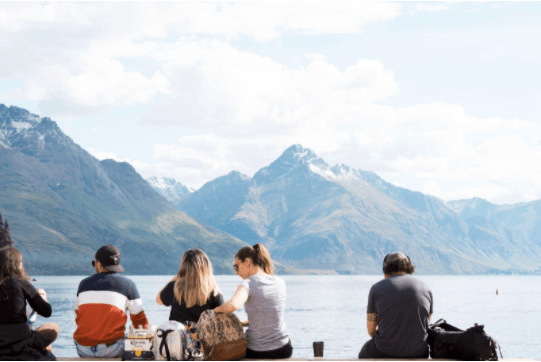Travel trends are the perfect indicators for the times we live in. From international escapades to local adventures, societal changes sweeping the globe have revolutionized all forms of travel. A number of travel trends have sprung up lately, and we’ve kept track of some of the latest changes influencing tourism sectors across the world.
 Photo by Natalya Zaritskaya on Unsplash
Photo by Natalya Zaritskaya on Unsplash
Below you will find several of the most notable travel trends. These trends shape the future of travel, and keeping track of them ensures that you won’t get lost in the sea of change faced by global tourism today.
Travel tech
Innovations in various areas of technology are affecting worldwide tourism drastically. From robot janitorial services to remote delivery platforms, advances in AI & other forms of tech have ensured the ongoing success of many hotels, restaurants, resorts, and other holiday destinations.
Zero-touch tech & contactless systems have been critical for staff & visitor safety, irrespective of geographic location. These days you can automate most booking processes, and payments can be made with the touch of a button. Touchless payments have become influential so much that they are being used in tourism marketing campaigns with excellent results.
Improved administration systems are helping travel agencies cope with an unprecedented influx of customers. Having secure & stable tech infrastructure has proven invaluable in recent years, as digital crime has become a genuine threat to a wide range of industries, tourism included.
Eco-friendly tourism
Tourists from all over the world are becoming increasingly conscious of how their travel impacts the environment. Countries that can prioritize eco-friendly tourism are experiencing more incredible growth than more conservative nations.
Some nature-conscious companies have taken it upon themselves to solve emerging environmental issues related to tourism markets. In Africa, for example, private poaching has recently suffered from a significant lack of funding, as wealthy international tourists have been unable to travel long distances. Adventure & travel companies like Pelorus and Yonder have developed charities & socio-economic programs to combat the funding deficit to great success.
 Photo by S O C I A L . C U T on Unsplash
Photo by S O C I A L . C U T on Unsplash
Local market investment
From local produce to in-house staff requirements, centralized supply chains are changing the ebb and flow of the tourism industry. Countries with the highest tourism profits maximize efficiency by cutting out long production chains & unnecessary logistics expenses.
Due to the diverse restrictions placed on international markets over the last few years, many countries have had no choice but to source localized means of supply & production. New health & safety regulations have been the root cause for many of these significant changes. However, on the bright side, these countries are becoming increasingly self-reliant.
To grow (or maintain) a healthy tourism sector, local market investment is becoming a deciding factor for the success or failure of any hospitality industry. The more localized a supply chain is, the greater the stability in times of travel restriction, or any other crises for that matter.
Agent resurgence
When your typical holiday destination is off the cards, it can be quite the challenge to find a suitable holiday destination. Finding a worthy substitute is a lot easier with the help of a travel agency or trip advisor. With so many countries still facing travel restrictions, many of us simply don’t know where to go on holiday. Travel agencies provide valuable knowledge in these times of uncertainty.
As more people begin to make their holiday plans, many are looking to these experts for advice on where to go. This has led to travel agencies seeing a sharp uptick in need for their professional services. Tourists don’t just want to see the most significant holiday attractions anymore; many are looking for destinations with local significance, preferring to embrace cultural differences instead of observing them from afar.
Remote work
Remote work seems like it might be here to stay. Being able to work from anywhere means that tourism has become a lot more accessible than it used to be. Travel businesses & tour operators need to keep in mind that vacations aren’t as dependent on the time of year as they used to be. Typical vacation months will still see a foreseeable increase for travel, but they are becoming less reliable indicators as a metric for long-term sustainability.
A lot of travelers don’t need time off from work to take a trip anymore. Coupled with a craving for travel post-isolation, many holiday goers are looking for unfamiliar environments, places that are void of the stresses associated with home lockdowns. Remote work has also given families more time together and is a trend that will continue to grow exponentially in the future.
 Photo by Ibrahim Rifath on Unsplash
Photo by Ibrahim Rifath on Unsplash
Solo travel
The longer we stay cooped up at home, the more stir crazy we tend to get. Many of us have been stuck at home for a lot longer than we would like. Even introverts are craving some adventure out in the world. Solo travel is becoming a popular choice for many of us, as the need for new sights and sounds gradually overrides our need for regular social contact; the latter has still been possible while at home, but the former has proven nigh impossible for the great majority of us.
As we all begin to set our sights on new horizons, many companies try to get an edge over their competition wherever possible. Solo travel packages are becoming increasingly common promotions. With enticing pricing & alluring destinations, people who need to get away from it all have grown to represent a significant portion of any tourism market.
Virtual reality (VR) tourism
These days ‘sustainable tourism’ isn’t simply a buzzword. To continue operating in challenging times, tourism sectors from all corners of the world have looked at various avenues for relief, including VR tours and simulated adventures.
Virtual tours have become an outlet for feelings of restlessness. For instance, National Geographic uses VR to significant effect, transporting users to exotic locations across the globe. Wander is a VR app that offers many virtual wonders, such as the Taj Mahal and the pyramids of Egypt. Alcove gives its users access to virtual hot air balloons & simulated bus tours. VR and other travel trends have become emerging market influencers worth noting despite a steady return to what we would consider normality.


